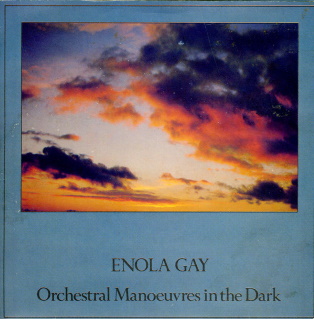
Enola Gay (song)
"Enola Gay" is an anti-war song by the English electronic band Orchestral Manoeuvres in the Dark (OMD), and the only single taken from their second studio album Organisation (1980). Written by lead vocalist and bassist Andy McCluskey, it addresses the atomic bombing of Hiroshima by the aircraft Enola Gay on 6 August 1945, toward the conclusion of World War II. As is typical of early OMD singles, the song features a melodic synthesizer break instead of a sung chorus.
"Enola Gay"
"Enola Gay" met with largely positive reviews but was seen as unlikely to impact the charts; aside from its subject matter, the song faced some resistance due to its being perceived as a gay anthem. It eventually reached No. 8 on the UK Singles Chart, becoming the band's first top 10 entry in their home country. It was also a hit throughout continental Europe, topping the charts in Italy, Portugal and Spain. The track achieved sales in excess of 5 million copies. It has been named as one of the best songs of its era and genre, and, along with 1986's "If You Leave", is regarded as OMD's signature song.
Composition[edit]
Arrangement[edit]
Typical of early OMD compositions, the track does not feature a vocal chorus,[5] and is recognisable by its distinctive lead synthesizer hook and ambiguous lyrical content.[6][7] Most of the melodic parts were recorded on a Korg Micro-Preset, and the drum machine sound was "about the last thing to go on" the recording.[7] The song is based on the '50s progression, which repeats throughout the entire song. Speaking to Songwriting Magazine, McCluskey stated, "It's a typical linear OMD song, it is the same four chords all the way through and it never varies. The verse, the melody, the middle eight, it's all the same."[8]
Keyboardist Paul Humphreys and OMD manager Paul Collister were not fans of "Enola Gay" (the latter originally threatened to resign if it were released as a single). Collister did, however, believe it was a surefire hit – a view that drummer Malcolm Holmes did not share. Initially proud of the song, McCluskey's confidence wavered: he re-recorded his vocal, but was dissatisfied with the final mix of the track.[9]
Critical reception[edit]
The song met with largely positive reviews.[9] Greg Reibman of Boston Rock wrote, "With 'Enola Gay', Orchestral Manoeuvres drop another devastating warhead on the world of inferior pop music... these guys are right on target."[21] Canberra Times critic Jonathan Green described the track as "super", with "a lovely melody that makes for an utterly infectious song".[22] Daniela Soave of Record Mirror called it "infinitely danceable, joyous and jumpy", while noting an uneasy juxtaposition between the musical content and sombre lyrics.[23] NME said the track has "considerable plusses" including a "glorious melody", but expressed reservations about its commercial prospects, feeling it was destined for "chartless oblivion".[24] The song was banned from being played on popular BBC1 children's programme Swap Shop, because it was thought to promote homosexuality.[25][26][27]
Despite its subject matter, the single was released at a time of strong anti-nuclear sentiment in Britain.[20][28] This, according to the BBC, helped it become an "unlikely hit".[20] The track entered the UK Singles Chart at number 59,[29] but climbed 51 places over the next four weeks to reach a peak of number 8,[30] becoming the group's first top 10 entry in their home country and one of the 50 best-selling singles in the UK in 1980.[31] It was also a hit throughout continental Europe, topping the charts in Italy, Portugal and Spain.[32][33][34]
In a retrospective assessment, AllMusic's Ned Raggett lauded the song as "astounding... a flat-out pop classic – clever, heartfelt, thrilling, and confident, not to mention catchy and arranged brilliantly".[35] Critic Dave Thompson called it a "perfect synth-dance-pop extravaganza".[28] John Bergstrom of PopMatters wrote, "'80s synthpop takes a lot of flack, much of it deserved. But 'Enola Gay' is a resounding refutation of the notion nothing substantial, beautiful, or timeless could ever come from skinny English guys with synths... Everything a classic should be."[36]
Music video[edit]
The music video was shot at the ITN studios in three hours one afternoon.[64] It begins by showing sped-up footage of clouds passing through the sky. After the opening riff, which is shown as the keyboardist's hands playing whilst being animated using digital rotoscoping, it shows a transparent video image of McCluskey vocalising and playing bass guitar.
B-side[edit]
The B-side on the UK release of "Enola Gay" was a track entitled "Annex". The song was not included on the ensuing Organisation album and remained unique to this release until being included in the 2001 compilation album Navigation: The OMD B-Sides and the 2003 remastered edition of Organisation. Although the track was basically an improvisation "made up on the spot", Paul Humphreys described it in a 1980 interview as "the best thing we've done all year";[65] AllMusic critic Aaron Badgley later called it a "brilliant" song.[66]
Alternative versions[edit]
In 1998, David Guetta & Joachim Garraud and Sash! made remixed versions of the song for the intended second disc of The OMD Singles. The second disc was dropped, and eventually only the Sash! remix appeared on The OMD Remixes EPs. In 2003 the double disc version was released in France only, which included the remixed versions by Guetta and Garraud as well. Hot Chip remixed the song to coincide with its 40th anniversary re-release.[58]
An early version of the song with a slightly different arrangement appears on the group's Peel Sessions 1979–1983 album. A live performance, recorded at the Guildhall in Portsmouth, England on 19 September 1980, is featured in the film Urgh! A Music War (1982).
Musician Howard Jones covered the song during early live performances.[79]